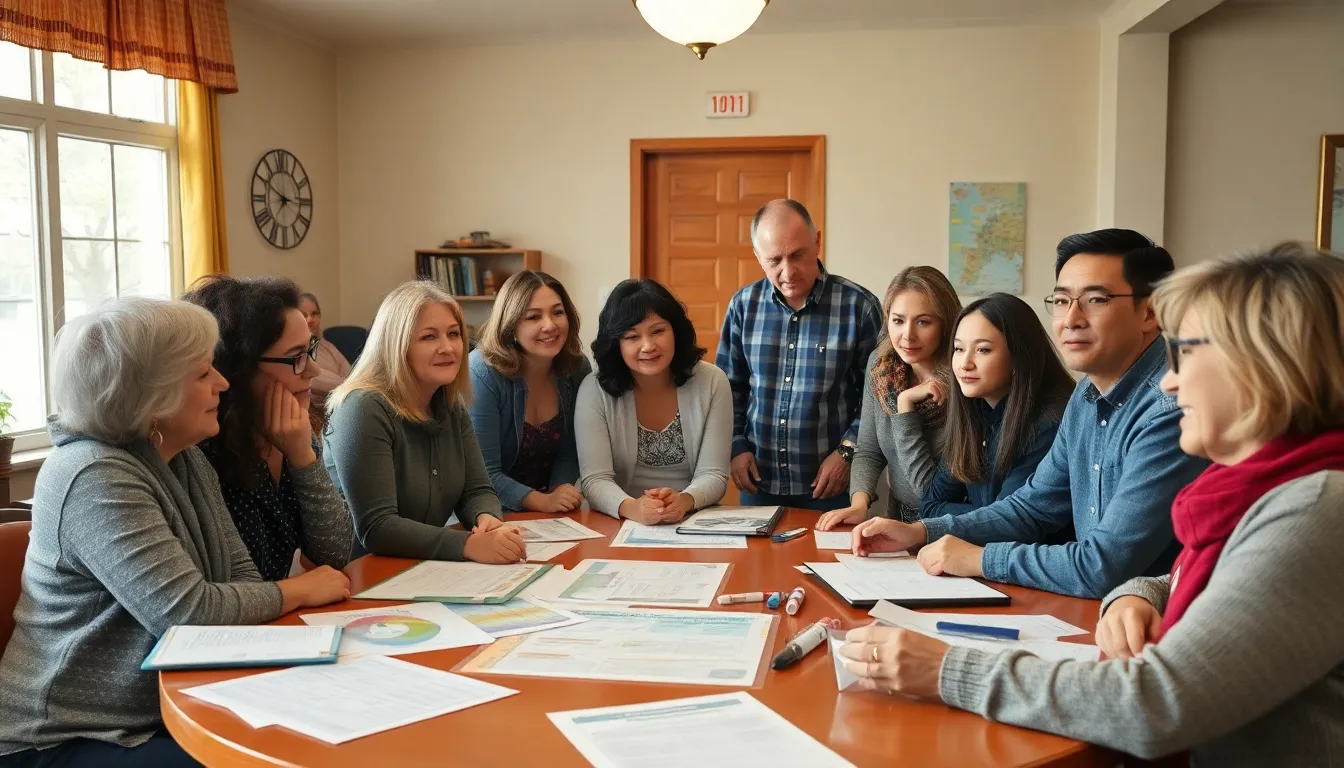In a world where political memes spread faster than actual news, having a solid political knowledge base is more crucial than ever. It’s like trying to navigate a maze blindfolded—without the right information, one can easily end up in a dead end. Understanding political systems, key players, and current events isn’t just for the news junkies; it’s essential for anyone who wants to engage in meaningful conversations and make informed decisions.
Imagine walking into a debate armed with facts instead of just opinions. It’s a game changer. A well-rounded political knowledge base empowers individuals to challenge misinformation and contribute to discussions that matter. So, whether you’re a seasoned political aficionado or just dipping your toes into the political pond, building that knowledge base can be both enlightening and entertaining. After all, who wouldn’t want to impress friends with a well-timed political reference?
Table of Contents
ToggleOverview of Political Knowledge Base
A robust political knowledge base encompasses an understanding of political systems, influential figures, and timely events. Individuals benefit from grasping concepts such as governance structures, party systems, and electoral processes. Familiarity with local, national, and global issues enables effective participation in political discussions.
Effective engagement requires awareness of key political players. This includes elected officials, party leaders, and influential activists. Recognizing their roles aids individuals in understanding political dynamics and their impact on society.
Current events shape political landscapes. Staying informed about news helps individuals relate discussions to real-world outcomes. Investigating diverse news sources enhances critical thinking about political information, allowing for a deeper comprehension of issues.
Incorporating historical context enriches political understanding. Knowledge of past political events provides insight into contemporary issues. This historical framework aids individuals in recognizing patterns, identifying risks, and anticipating potential outcomes.
Enhancing a political knowledge base involves active participation in discussions and community engagement. Engaging with local organizations, attending forums, and joining civic groups fosters informed dialogue. Collaborative learning from peers cultivates diverse perspectives, further broadening one’s understanding of political matters.
A desire for continuous learning supports a dynamic political knowledge base. Reading books, articles, and research papers provides valuable information and context. Online courses and webinars also serve as effective tools for enhancing political literacy.
Approaching political discussions with curiosity and an open mind encourages constructive engagement. Building a knowledge base empowers individuals to challenge misinformation and share accurate information within their communities.
Importance of Political Knowledge

Understanding political systems is essential in today’s society. Civic engagement thrives on individuals who actively participate in their communities.
Civic Engagement
Active participation fosters a sense of responsibility. Communities benefit when residents engage in local governance through town hall meetings or neighborhood organizations. Civic engagement also strengthens democracy by encouraging diverse viewpoints. People who understand political issues can advocate effectively for their interests. Informed citizens make better decisions about public policies. Awareness of local and national challenges drives individuals to take collective action. Discussions about civic responsibilities often lead to solutions that resonate with constituents. Political knowledge empowers individuals to hold elected officials accountable. Overall, increased civic engagement cultivates a more informed and active citizenry.
Informed Decision Making
Making informed decisions is crucial for effective citizenship. A solid political knowledge base equips individuals with the facts necessary for evaluating policies. By understanding issues, citizens can discern credible information from misinformation. Knowledge about candidate platforms allows voters to select those aligned with their values. Recognizing the implications of local, national, and global events informs personal and community choices. People who stay updated on current affairs can anticipate the effects of legislation on their lives. Engaging with reliable sources deepens understanding of complex topics. Informed citizens contribute to discussions that shape society’s future. Ultimately, political knowledge enhances decision-making, fostering a more engaged and responsible electorate.
Components of Political Knowledge
Understanding the components of political knowledge is vital for informed discourse. This section highlights key areas that contribute to a robust political foundation.
Current Events and Issues
Staying current on events and issues anchors political knowledge. News outlets, online platforms, and social media provide real-time updates on political developments. Engaging with diverse sources helps individuals grasp the nuances of these issues. Participating in community discussions fosters a deeper understanding of how local and global events intersect. Keeping abreast of current events empowers individuals to form reasoned opinions based on accurate information.
Political Systems and Structures
Political systems and structures form the backbone of governance. Familiarity with different types of government, such as democracies and autocracies, aids in understanding their operations. Learning about the separation of powers illustrates how branches of government interact and maintain checks and balances. Knowledge of political parties and electoral processes enhances comprehension of how leaders are selected. Recognizing these structures equips individuals with the tools to analyze political behavior and policies effectively.
Historical Context
Historical context enriches political knowledge by revealing developments over time. Learning about past events, legislation, and social movements provides perspective on current issues. Analyzing historical patterns highlights how previous decisions influence contemporary politics. Engaging with historical documents and scholarly sources fosters a well-rounded understanding of political dynamics. Contextual knowledge enables individuals to appreciate the significance of ongoing debates and their implications for the future.
Strategies to Enhance Political Knowledge
Engaging in strategies to enhance political knowledge significantly benefits individuals and communities. Various methods exist to cultivate a deeper understanding of political landscapes.
Education and Curriculum
Implementing comprehensive education curricula that focus on political systems fosters informed citizens. Schools should emphasize teaching governance structures, party systems, and electoral processes. Integrating local, national, and global issues into lessons enriches students’ awareness of real-world implications. Providing opportunities for debates and discussions helps develop critical thinking skills. Furthermore, involving students in simulations of political processes encourages active participation and enhances their understanding of civic responsibilities. Advanced placement courses in government and politics prepare students for real-life challenges.
Media Literacy
Developing media literacy skills equips individuals to discern credible information from misinformation. Assessing various news sources helps them understand different viewpoints on current events. Focusing on fact-checking and evaluating sources cultivates a habit of critical consumption. Discussions on biased reporting and sensationalism raise awareness about the influence of media on public perception. Engaging with digital platforms also enhances exposure to diverse narratives, promoting a balanced perspective. Encouraging collaboration in local organizations facilitates informed discussions about media representation and fosters a community of critical thinkers.
A solid political knowledge base is essential in today’s complex landscape. It empowers individuals to engage meaningfully in discussions and make informed decisions that impact their lives and communities. By fostering curiosity and a commitment to continuous learning, people can navigate the intricacies of political systems and current events more effectively.
Civic engagement plays a crucial role in strengthening democracy. Informed citizens can advocate for their interests and hold leaders accountable. As individuals deepen their understanding of political dynamics, they contribute to a more enlightened electorate that values diverse perspectives and informed dialogue.





